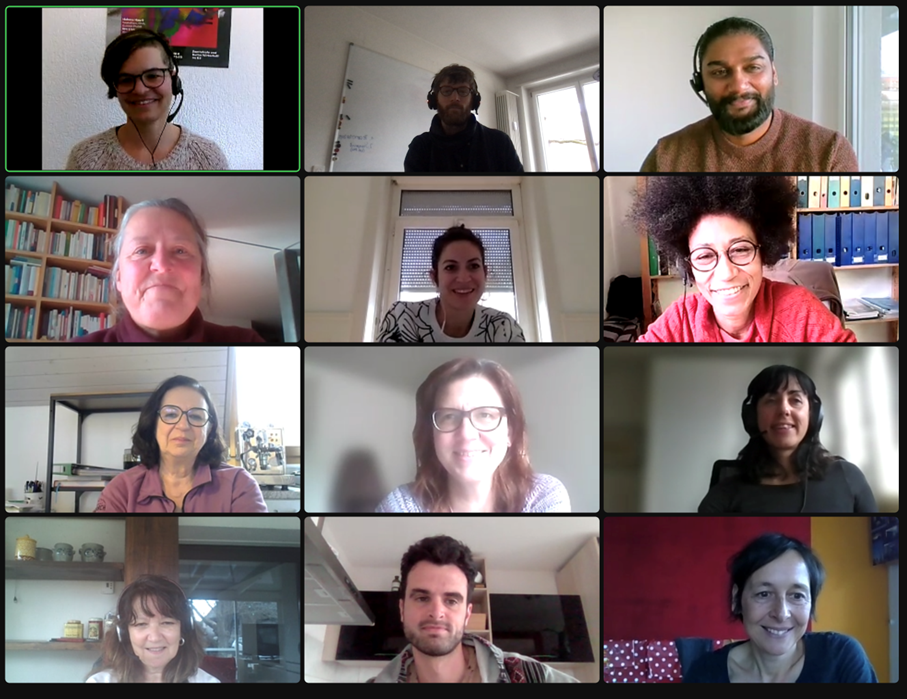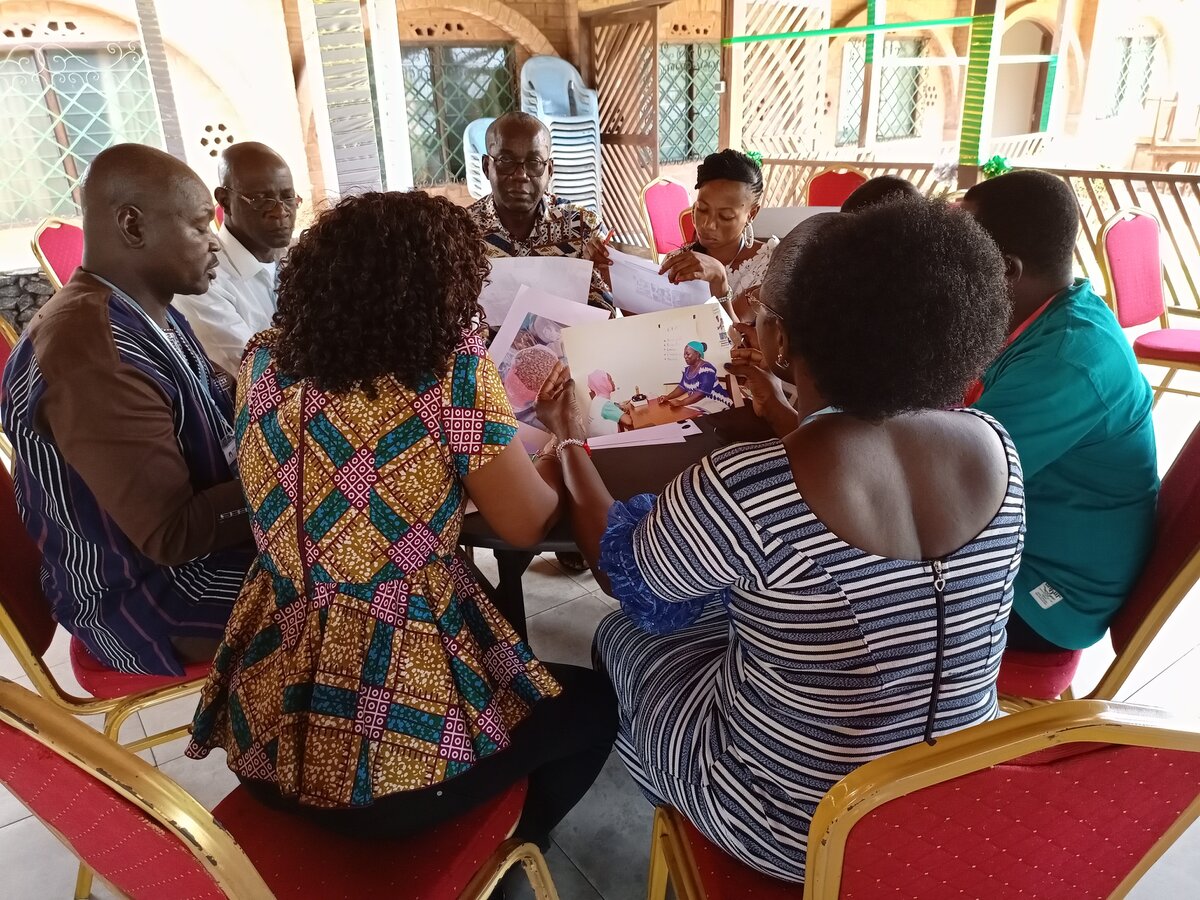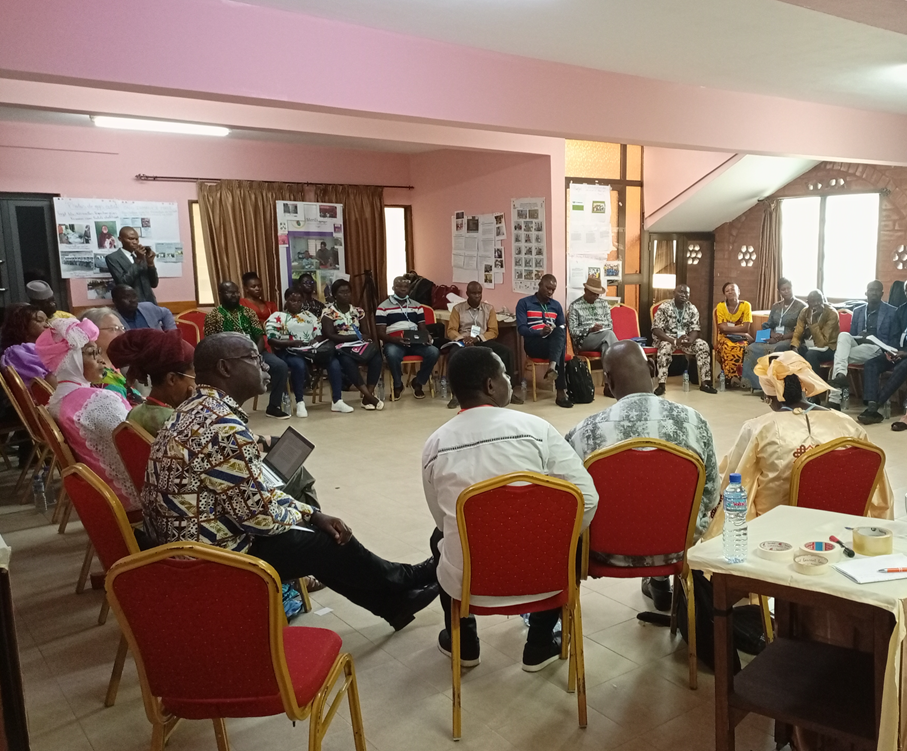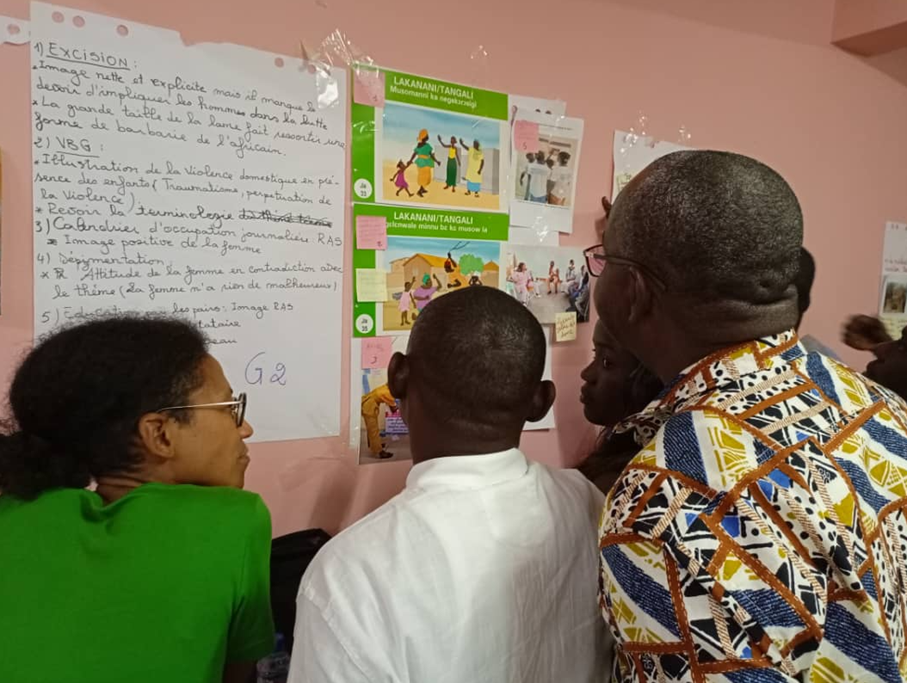- Exchange and Networking
- Knowledge and Learning
- Advocacy
- Photo gallery
- Our topics
By Serena O. Dankwa
“Decolonization” in the world of development cooperation is often equated with the goal of building equitable partnerships between organizations in the North and their “local partners” in the South. But how equitable can we be, if our development NGOs in the North are considered international, while the NGOs we are funding in the South are considered local, no matter how many organizations from different donor nations they are reporting to? IAMANEH Switzerland has long been aware of the challenge of equitable partnerships in an unequal world. However, it takes courage to understand these inequalities as part of the (neo) colonial structure we are all still implicated in. Here is how our journey began.

It all started with an online team workshop facilitated by a Berlin-based association for power-critical education and counselling. In two 5-hour sessions they encouraged us to explore the colonial premises structuring our working environment. We began by considering our own gendered and racialized histories and identities. The term decolonization did not figure. It was too big a word, the course leaders held, when we asked for a workshop on this subject. Instead, they offered to open up “postcolonial perspectives on the field of development cooperation” and facilitated reflections on “colonial continuities with the longer-term goal of contributing to the power-critical transformation of our field".
Being critical of power, while facing colonial legacies, implies being critical of racism, we understood. The invention of (superior and inferior) races was integral to legitimizing colonial violence and its “civilizing mission.” Military subjugation, political infiltration and economic exploitation were bound up with the ideology of a seemingly superior white race and its (predatory) capitalist culture. Not least colonization was a psychological process that “erased, suppressed and demonized all indigenous non-western knowledge systems. In particular knowledges of women (e.g., alchemist, wise women), of ‘peasants’ and working classes” (Tamale, S. 2020). The notion prevails that the views and knowledge hailing from white people are more powerful and need to be incorporated. It permeates the minds of former colonizers and colonized and shapes our partnerships no matter how collaborative they may be.
But how equitable can we be, if our development NGOs in the North are considered international, while the NGOs we are funding in the South are considered local, no matter how many organizations from different donor nations they are reporting to?
Yet, Pakistani aid policy analyst Themrise N. Khan and other scholars in the South, caution that we are not doing ourselves a favor by using decolonization as a catch all term for processes as different as turning over colonial rule, which was a bloody revolution, and negotiations within the development sector. Development cooperation, however unjust it may be, is based on formal agreements. Besides, Khan argued at the Mission 21 “Decolonize Aid” symposium, the call to decolonize is a paradox if its strings are pulled from the North. The terms for decolonization must be set by the (formerly) colonized and by taking seriously decolonial scholarship that has long been produced by academics in the South. If decolonization is not something that can be imposed on others, but only something we can start working towards by challenging our own biases, it must start at home and at the heart of our own institutions.

In the workshop it became much clearer how even small NGOs like IAMANEH Switzerland that are not implementing projects abroad, but supporting initiatives of community based organizations are inevitably setting the tone, when fitting projects outlined by our partners into the programs and log frames that cater to our donors in the North. Sure, we encourage our partner’s active participation and aim at working “at eye level.” But is this metaphor useful, given how inconvenient and in many places even impolite it is to directly look into the eyes of those who hold the power to provide you with money? Would eye level not mean to entitle our partners to the same organizational and financial possibilities applicable to us, such as building up organizational reserves, or granting overheads allowing flexibility to cover institutional costs? We agreed to reflect on this aspect and, together with our partners, endeavor to identify more equitable solutions.
To start with, however, our team workshop focused on communication and our attempts not to activate images of Africans as needy, hence inferior, knowing that the continuation of stereotypical images is harmful to Black people everywhere. It is not wrong what we say about “harmful cultural practices” such as FGM/FGC in our publications. The problem lies in what remains unsaid: the clitorectomies performed on “hysteric” women in Europe until the 1970s (Wikipedia); genital surgeries that can still be performed on intersex children in Switzerland, not for medical reasons but to fit them into a binary gender norm; the Barbie look ideals that are inspiring even younger women to undergo “genital cosmetic surgery” (Donner, S., 2018). The actual procedures are very similar to what has been tagged FGM, and so are the rationale given by the women who wish to conform to these intimate cultural norms. The names and its legal regulations, however, are very different (Bader, D. 2016).
But who wants to hear about the connectedness of patriarchal “mutilations” in Switzerland and Mali, when images of big-eyed Black girls have proven the best driver to encourage generous donations? Challenging and changing these long-established communication practices requires creativity, contextual knowledge and the ongoing critical education of ourselves and our donors, hoping that human development will be recognized as a global project of transformative solidarity and redistribution rather than a practice of giving alms.
In the workshop it became much clearer how even small NGOs like IAMANEH Switzerland that are not implementing projects abroad, but supporting initiatives of community based organizations are inevitably setting the tone, when fitting project outlined by our partners into the programs and log frames that cater to our donors in the North.
Interrogating our own structures and practices takes time and space. After the workshop it was clear that such working spaces must be granted to our partner organizations as well; we are all in need of decolonizing our minds and actions. First, we involved our West African coordinators. What started as workshop summary, ended up as a three-hour conversation on the dire need to be critical of power in all our North-South exchanges rather than turning decolonization into a buzzword. For us, the Swiss-based members of IAMANEH, it was not easy to hear about the physical violence some of their parents had endured under colonialism and to bear with the fact that they felt nothing much has changed since the end of colonial rule. Others emphasized that SRHR development can only succeed on the basis of feminist solidarities rather than on an aid mentality, which requires North-South conversations like the one we had just initiated. A beginning was made.

Four months later in a rose-colored hall in Lomé, Togo, almost forty of us in a large circle, representatives from all our West African partner organizations. During the weeklong annual partner’s meeting three consultants from Benin and Cameroon worked with us. They were part of the young NGO PLACE for Africa, specialized in anti-discrimination, intersectionality and the deconstruction of colonial thoughts in development collaborations. Although we had notified that our partner meeting will host this workshop, the surprise was big and the alertness high, when PLACE for Africa began to explain how racialized, colonial power structures have been internalized while still manifesting themselves ideologically, institutionally, and interpersonally in our partnerships. Their inputs met open ears. One participant related: “Yes, independence came, but it was only a façade. The system that remained continues colonization. It’s visible in education, in our money. If you look at it, I can't say we are independent. The CFA is directly controlled by France. We buy raw materials in a currency that is not ours. Regarding the law, we have copied the French Constitution. Weapons are only supplied with the French OK. And the school programs are not adapted to our reality. It produces people who are not operational in their own societies.”
One participant related: “Yes, independence came, but it was only a façade. The system that remained continues colonization. It’s visible in education, in our money. If you look at it, I can't say we are independent.
Clearly, our partners had long been thinking about the coloniality framing their work. But, as one participant formulated it, “there are no spaces to talk and think about it. It's more the activists discussing among themselves and on social media, but there is no organized debate between NGOs North-South partners listening to each other. As an activist, you won’t articulate yourself within your international partnerships.” The time and spaces to discuss were highly appreciated – both the ones with and without IAMANEH’s three Swiss representatives. The workshop allowed to share experiences around coping with the narrow funding schemes of major health organizations from North.
One participant related how her NGO had proposed to empower a specific women’s groups, knowing that the women would encourage each other to consult the local health centers. But she was told that this kind of support needed to come from her state. She ended her statement with the question, “but why are our states so poor?» Regarding their involvement with large health and development agencies, a seasoned Malian NGO director summed up: "Ce que nous allons demander à nos partenaires, c’est de nous impliquer dans l’élaboration des théories de changement – tout partenaires [du nord] ont une théorie de changement – et dans les plans stratégiques" (Video by PLACE for Africa, see minute 7.15). While IAMANEH was lauded for doing exactly that, working towards implicating the partner organizations at all stages and for the courage of broaching questions around coloniality, it was critiqued that we should focus more on the gender indicators and national health plans of the partners’ countries than on the one’s coming from our donors.
While IAMANEH was lauded for doing exactly that, working towards implicating the partner organizations at all stages and for the courage of broaching questions around coloniality, it was critiqued that we should focus more on the gender indicators and national health plans of the partners’ countries than on the one’s coming from our donors.

The workshop became hands on, when we analyzed our own publications, thus the language and images employed by IAMANEH Switzerland but also by our partner organizations. The broad understanding of power and its marginalized “others” introduced in the workshop also allowed for the critical self-reflection of norms and hierarchies within African NGOs. A young woman cautioned that “domination comes not only from the dominant countries. There are systems of dominance within our organizations.” And a long-standing partner and head of a health NGO concluded: "Autant que nous exigeons de nos partenaires du nord c’est comme ça que nous devons nous comporter aussi avec nos partenaires de terrain et ne pas venir au terrain conquis [pour] imposer nos points des vues. Parce que … c’est nous qui sommes les intermédiaires au niveau du terrain, donc imposant nos volontés, nos façons de voir etc. aux populations qui souvent aux fautes de mieux sont obligé d’accepter quelque chose qu’elles n’ont pas demander ou que si même ils l’ont demandé voudraient le faire autrement ou bien être beaucoup plus impliquer dans la mise en œuvre" (Video by PLACE for Africa, see minute 9.28).
Starting a process of critical reflection together with our partners, made us realize that perhaps the question should not only be one of eye level. Rather it is about developing a shared practice with the goal of exercising less power. This requires an ongoing critical reflection and the awareness that power, as seen in the above quote, is always multi-layered and multi-dimensional. IAMANEH has embarked on the journey of questioning power and building transformative solidarities.